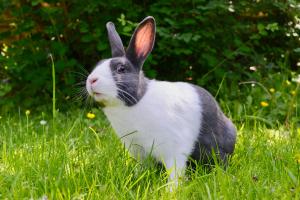
By Veterinary Nurse Donna Hall
Rabbits are intelligent, inquisitive and make great pets, but they are also a big commitment. There are a number of things you need to know to make sure they live happy and healthy lives.
When thinking about providing a home for your rabbit, it is important to know that rabbits can live happily outdoors or indoors, as long as the accommodation allows them to behave naturally, which means more than just a standard hutch.

Rabbits are active animals and similarly to other animals can develop skeletal problems if they are confined to a small cage. Therefore, daily exercise outside of the hutch is vital to the rabbit’s health. A hutch should only ever be used as a shelter and never the main accommodation for the rabbit. For this reason it is suggested a large hutch or even a shed that has an exercise run attached to it permanently, makes a good home.
Rabbits tend to be most active at dusk and dawn, and therefore removing them from their hutch during the day for a run around does not suit their body clocks or their instincts.
With regards to feeding, a good quality hay should be provided at all times. This contributes 85 per cent of their diet. Around 10 per cent of their diet can be leafy greens and herbs such as fresh coriander, broccoli or mange tout. In addition, your rabbit should be fed around 5 per cent of high fibre pellets which is 1-2 egg cups a day. This is recommended over muesli as it is a guaranteed balanced diet. A small amount of healthy treats can also be offered.
Neutering (castrating or spaying) rabbits is also important to helping them live a long and healthy life. It allows rabbits to be kept in groups without unnecessary breeding, but also helps prevent life threatening health problems. In addition, it is important to neuter mix-sex pairs of rabbits (or groups) so that they can live together happily and reduce fighting and aggression.
Rabbits are also vaccinated against myxomatosis and rabbit viral haemorrhagic disease (RVHD). Both of these diseases can be transmitted by wild rabbits in the area or flea or midge bites. It is fatal if the rabbits contract these diseases, so prevention is key. Usually, we don’t see any side effects to the vaccines, and it is only one vaccine given once a year - a good opportunity for a general health check with your vet too.